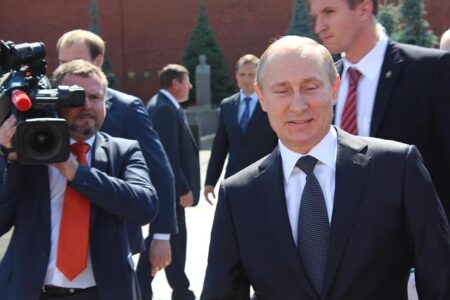Russia: Utilizing the Soviet Triumph Over Nazi Germany
In an era where ancient narratives significantly influence national identities, Russia has increasingly embraced it’s monumental victory over Nazi Germany in World War II as a foundational element of its contemporary political narrative. The Soviet Union’s success, celebrated each year on May 9th as Victory Day, serves not only as a moment of reflection but also as a potent emblem of resilience and national pride.In recent years, however, the Kremlin has escalated its efforts to manipulate this crucial historical event to strengthen its domestic agenda and assert its geopolitical position. As tensions escalate between Russia and Western nations, the commemoration of this victory has evolved into a mechanism for promoting national unity and justifying current policies, frequently enough blurring the lines between historical memory and state propaganda. This article explores how Russia’s depiction of the Soviet triumph is reshaping public perception, influencing international relations, and fostering a narrative of greatness that aims to resonate with younger generations.
Russia’s Historical Narrative: Highlighting Soviet Sacrifice in World War II
The narrative crafted by the Russian government regarding the contributions made by the Soviet Union during World War II transcends mere historical remembrance; it serves as a strategic reinforcement of national identity and social cohesion. Central to this narrative is an emphasis on sacrifice, illustrating the staggering loss of life, resources, and civilian suffering endured by Soviets in their battle against Nazi forces. Key events such as the Battle of Stalingrad and the Siege of Leningrad are memorialized as epic confrontations that epitomize Soviet resilience. This portrayal often elevates figures like Joseph Stalin to heroic status despite their controversial legacies.
To solidify this narrative further,various commemorative practices are employed by Russian authorities that embed memories of sacrifice into collective consciousness. Events like Victory Day parades, along with educational initiatives in schools emphasize essential aspects of this historical perspective. Additionally, state media frequently highlights notable statistics such as:
- An estimated 27 million lives lost among Soviets during WWII.
- Around 1.3 million soldiers defended stalingrad.
- The decisive Victory at Kursk marked a turning point on the Eastern Front.
These figures not only commemorate past sacrifices but also serve powerful political purposes that foster unity and pride within national heritage. In modern-day Russia, depictions surrounding World War II are thus integral components intertwined with broader socio-political agendas.
Contemporary Politics: Harnessing Victory for National Identity and Influence
In present-day Russia, narratives surrounding WWII victories function effectively as instruments for shaping both national identity and geopolitical influence. Known locally as the Great Patriotic War, these events represent more than mere history; they form an essential part of Russian pride deeply embedded within societal consciousness. This remembrance is carefully curated through state-sponsored propaganda alongside educational programs emphasizing themes such as resilience , sacrifice ,and heroism . By celebrating these victories ,the Russian government fortifies collective memory among citizens while framing itas unifying force amidst domestic challenges . Furthermore ,this focus on past triumphs cultivates an imageof Russiaasa formidable power capableof countering perceived fascist ideologies today.
Moreover,the utilizationof historic victories allows Russiato projectits influence globally—especiallyin regions historically linkedto thesoviet union .Through cultural diplomacyandmilitary commemorations,the Kremlin seeks solidarityamongpost-Soviet stateswhile simultaneously projecting strengthtowardWestern adversaries.Key strategies include:
- International Celebrations: Grand parades showcasing military prowess.
- Cultural Outreach: Promoting films,literature,and art depicting valor fromtheSoviet era.
- Diplomatic Engagements: Collaboratingwith former allied nations toreaffirmhistorical ties.
- Cultural Outreach: Promoting films,literature,and art depicting valor fromtheSoviet era.
this approach not only rekindles pride withinRussia butalso subtly reminds global audiencesofthe country’shistorical significanceandcurrent resolve.
Global Relations Implications: Balancing Memory with Diplomacy
The way Russia commemoratesitsvictory overNaziGermany playsa crucial rolein shaping diplomatic relationships—particularlywithinEastern Europe.The government’s handlingofmemoryisn’t merelyhistorical;it strategically bolstersnational pride while undermining perceptionsofthe West.This dynamic createscomplex interactionswhereformerSovietstates grapplewiththeir sharedhistorieswhile strivingforsovereignty.For nationslikeUkraineandtheBaltic states,the recollectionofSoviet actionsduringWWII becomesa double-edged sword—igniting nationalist sentimentsyet fosteringanxietyoverRussian expansionism.The ongoing tensionbetween honoringhistoricalmemoriesandmaintaining diplomaticrelationswiththeWesthighlightsabroader conflictbetween nostalgiaandcontemporarypolitics.
Simultaneously,the intentional useofsoviet symbolisminmodernRussian politicscarries significant implicationsforinternational relations.As countries navigate these delicate dynamics,multiple factors must be considered:
- Historical Narratives: Varied interpretations shape diplomatic stances.
- National Identity:Countries reformulate memories toenhanceprideandautonomy.
- < Strong Geopolitical Strategy:
the rhetoric surrounding sovietvictoriesoftenjustifiescurrentpoliciesormilitary actions. - < Strong Public Sentiment:Diverse domestic perceptionsimpactinternational alliancesandoften opposition.
This evolving landscape signals shiftsinpower dynamicsthat could redefineallianceswhile provokingdisputesoverhowhistoryis honored publicly.The abilityto engage indialogue whileacknowledginghistorical grievancesbecomes paramountfor sustainingastable international community.
Conclusion
As we contemplate thesignificant role playedbytheSovietUnion inthe defeatofNaziGermanyduringWorldWarII,it becomes evident howthisnarrativehas beenstrategically appropriatedbycontemporaryRussia.The commemorationoftheSovietvictoryhas shiftedfromsolemnreflectioninto apowerful toolfornationalistic discourseaimedat consolidatingpolitical authoritywhile shapingpublic perception.AsKremlincontinuesleveragingthislegacyfortheirown objectives,the ramificationsonbothdomesticandinternational dialoguesare profound.Understandingthese complexitiesnotonly illuminatestoday’spolitical landscapebutalsounderscoreshistory’slastingimpactonthenurturingnationalidentity.Inan agewhere narrativescanbe wieldedasweapons,pasteventsremaincrucialintheformationofpresentdaygeopolitics.




